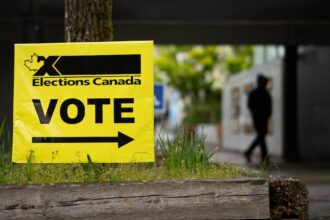In the wake of escalating cross-border tensions, British Columbia Premier David Eby declared Wednesday that Canadians should wear former President Donald Trump’s “nasty” label as a “badge of honor,” signaling a dramatic shift in Canada-U.S. relations that continues to reverberate through North American politics.
“When Trump calls us ‘nasty’ for defending our economic interests, for standing up for our workers and industries, we should see that as confirmation we’re doing exactly what we need to do,” Eby told reporters during an impromptu press conference in Vancouver. His comments came after Trump, now seeking another term in the White House, singled out Canada during a campaign rally in Michigan, threatening punitive tariffs and describing Canadian trade officials as “manipulative and nasty negotiators.”
The verbal sparring represents the most significant diplomatic tension between the two nations since the 2018 G7 summit when Trump withdrew U.S. support for a joint communiqué and criticized then-Prime Minister Justin Trudeau. Current polling suggests the confrontational approach may be resonating with voters on both sides of the border, with Canada’s approval ratings actually improving domestically following Trump’s comments.
“This isn’t just political theater,” explains Dr. Eleanor Westbrook, international relations professor at University of Toronto. “We’re witnessing a fundamental recalibration of how Canada positions itself within North America. The traditional deference to American interests is being replaced by a more assertive stance on trade, environmental policy, and border security.”
Economic analysts are closely monitoring the situation as Canada’s dependence on U.S. trade remains significant. The Canadian dollar experienced modest volatility following Trump’s remarks, with investors uncertain about potential implications for the recently renegotiated USMCA trade agreement.
“While Canadians might appreciate the symbolic stand against Trump’s rhetoric, there are real economic consequences to consider,” cautions Martin Chen, chief economist at Royal Bank of Canada. “Nearly 75% of our exports go to the United States. Any disruption to that relationship has cascading effects throughout our economy.”
Public opinion research indicates Canadians largely support the government’s more assertive stance. A recent Angus Reid poll found 68% of Canadians believe their government should “strongly defend Canadian interests even if it risks American retaliation,” representing a 12-point increase from similar polling in 2020.
The diplomatic tensions have broader implications for global politics. Several European leaders have quietly expressed support for Canada’s position, while China and Russia have used the discord to highlight what they characterize as weakening Western alliances.
Prime Minister Anita Anand’s office released a measured statement emphasizing Canada’s commitment to “respectful but firm diplomacy” while reiterating that Canada “will not compromise on fundamental national interests.” Behind closed doors, sources within the PMO indicate Canadian officials are preparing contingency plans should Trump return to office and implement threatened tariffs on Canadian steel, aluminum, and agricultural products.
Despite the heightened rhetoric, cross-border cooperation continues on critical security matters, with officials from both countries emphasizing that intelligence sharing and border security collaboration remain unaffected by the political discord.
As this situation unfolds, Canadians find themselves at a crossroads of national identity. “This moment is forcing us to articulate what we stand for as a nation,” notes Eby. “And increasingly, Canadians are comfortable saying we’ll be friendly neighbors, reliable allies, but we won’t be pushed around.”
The question now facing both nations: can this new, more assertive relationship survive the economic realities of deep integration, or will pragmatism eventually temper the rising nationalism on both sides of the world’s longest undefended border?
























